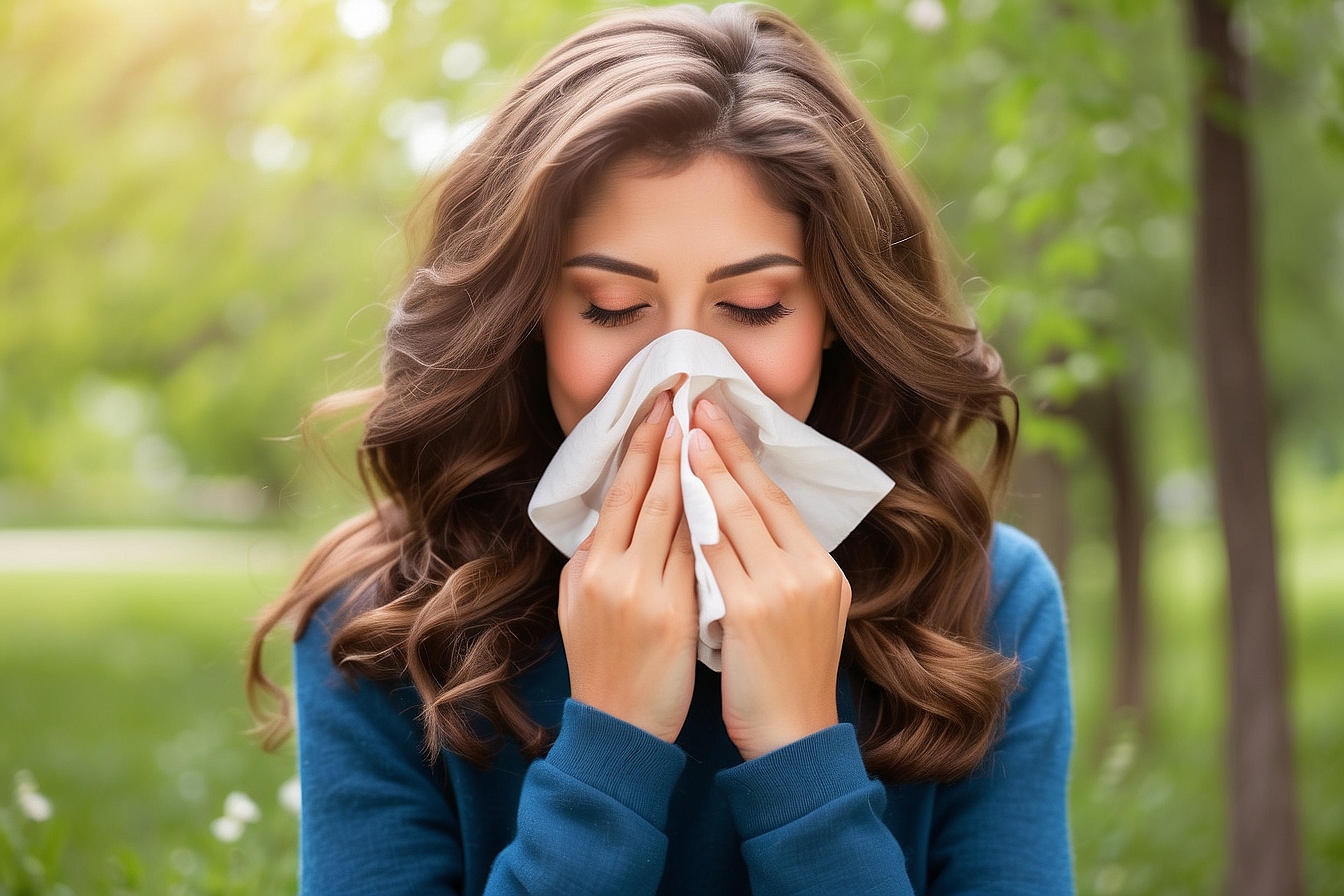Picture the scene: you’re out basking in the glorious sunshine when, out of nowhere, your nose starts to play up and your eyes begin itching like nobody’s business. We know how frustrating that can be – did you realise that around 20% of people across the UK share this pesky plight with hay fever? Our dedicated team has been digging deep into this conundrum, sifting through our green and pleasant land’s secrets to bring you not just insight but also a spot of respite.
So take a deeper breath and come along on a journey with us as we reveal savvy strategies to give you the upper hand against those irksome allergies!
Key Takeaways
- Genetics play a pivotal role in allergies, with conditions like atopy passing down from parents to children, increasing sensitivity to environmental allergens.
- The Hygiene Hypothesis suggests that too much cleanliness can lead to an underdeveloped immune system and potentially more allergies, emphasising the need for a balance between hygiene and exposure.
- Both natural events and human activities contribute to air pollution; whilst pollen comes from natural sources, pollutants from cars and factories worsen the quality of our air. This pollution can trigger or exacerbate allergic reactions.
- Stress isn’t just bad for your mental health—it also affects your immune system’s ability to handle allergens, highlighting the importance of stress management as part of allergy prevention.
- Keeping living spaces clean by using methods such as air purifiers and hypoallergenic bedding can greatly reduce exposure to indoor allergens.
The Role of Genetics in Allergies
Atopy and genetic predisposition play a significant role in the development of allergies. Understanding how genetics influence allergic diseases is crucial for effective management and treatment.
Atopy and genetic predisposition
We know that our genes play a critical role in determining whether we’re predisposed to allergies, and atopy is no exception. It’s a hereditary condition where your body has an exaggerated immune response to common environmental allergens like pollen, fungi, and dust mites.
This means if parents have allergic diseases such as asthma or hay fever, their children are more likely to develop similar conditions due to inherited sensitivities.
Our understanding of allergies must take into account this genetic aspect because it shapes how individuals react when exposed to various allergens. Those with atopic dispositions may experience stronger reactions from everyday exposures which others might easily tolerate.
As advocates for environmental conservation, we acknowledge the need for cleaner air and reduced pollution not just for overall health but also as a way of easing the burden on those genetically inclined towards allergies.
Innate Immune Stimulation and Allergenicity
Innate immune responses play a crucial role in the development of allergies. When exposed to allergens, our bodies release chemical signals that trigger inflammation and other immune reactions.
This innate response can lead to allergic symptoms such as itching, sneezing, and congestion as our body tries to eliminate the perceived threat.
Allergenicity refers to the ability of an environmental factor or substance to provoke an allergic reaction. The innate immune system is involved in detecting these allergens and signalling for a specific immune response.
Understanding how innate immune stimulation contributes to allergenicity helps us grasp the complex interplay between environmental factors and our body’s defensive mechanisms against potential threats.
The Influence of Environmental Factors
Environmental factors, such as natural and anthropogenic air pollution, stress, and the interplay of genetics and environment, play a significant role in the development of allergies.
Understanding these factors can help individuals identify potential triggers and take steps to manage their allergy symptoms effectively.
The Hygiene Hypothesis
The Hygiene Hypothesis suggests that early exposure to infectious agents, such as bacteria and viruses, play a fundamental role in the development of the immune system and its ability to distinguish between harmful and harmless substances.
This theory proposes that growing up in an overly clean environment may lead to an underdeveloped immune system, making individuals more susceptible to allergies later in life. Exposure to diverse microorganisms helps train the immune system to recognise and tolerate harmless substances like pollen or animal dander without triggering allergic reactions.
By embracing good hygiene practices whilst still allowing for regular exposure to natural environmental elements, we can strive towards a balanced approach that supports healthy immune function while minimising the risk of allergic responses.
Natural vs. Anthropogenic Air Pollution
Natural sources of air pollution, such as wildfires and volcanic eruptions, release particles and gases into the atmosphere. These natural emissions include pollen, dust, and organic compounds.
On the other hand, anthropogenic air pollution arises from human activities like industrial processes, transportation, and energy production. It involves emissions of pollutants such as nitrogen oxides (NOx), sulfur dioxide (SO2), carbon monoxide (CO), volatile organic compounds (VOCs), and particulate matter.
Both types of air pollution can worsen respiratory allergies by exposing individuals to airborne allergens.
While natural sources contribute to air pollution levels, anthropogenic activities significantly impact the environment’s overall air quality. Anthropogenic pollutants can lead to increased allergy triggers in susceptible individuals due to the higher concentration of harmful substances in the atmosphere.
Stress as a Factor in Allergies
Stress plays a vital role in the development and exacerbation of allergies. When we experience stress, our body releases certain chemicals that can trigger allergic reactions or make existing symptoms worse.
This is because stress weakens the immune system, making us more susceptible to allergens such as pollens, dust mites, and pet dander. Additionally, individuals under chronic stress are more likely to develop new allergies and sensitivities over time due to heightened inflammation and immune system dysregulation.
To further understand the impact of stress on allergies, it’s important to recognise the need for effective stress management techniques. By adopting mindfulness practices, engaging in physical activity or seeking professional support when necessary, we can reduce the negative effects of stress on our immune system and potentially alleviate allergy symptoms.
The Interplay of Genetics and Environment
Genetics and environment play crucial roles in the development of allergies. Genetic predisposition, known as atopy, can make individuals more susceptible to environmental allergens such as pollen or dust mites.
However, environmental factors like air pollution and stress also have a significant impact on allergy development. For instance, exposure to natural or anthropogenic air pollutants can exacerbate allergic responses in individuals with genetic predispositions.
Furthermore, stress can weaken the immune system’s ability to tolerate harmless substances, increasing the likelihood of developing allergies.
Understanding how genetics and the environment interact is essential for managing allergies effectively. By recognising the interplay between these two factors, we can develop targeted strategies to mitigate allergic reactions and create environments that are less conducive to triggering allergy symptoms.
Allergy Management and Treatment
We will discuss effective ways to manage and treat allergies, including getting rid of allergies, treatment methods and timelines. Read on to learn more about how to handle allergies and improve your quality of life.
Getting Rid of Allergies
To reduce exposure, maintain a clean living environment. Vacuum and dust regularly. Use an air purifier to improve indoor air quality. Keep windows closed during high pollen seasons. Wash bedding frequently in hot water to eliminate allergens. Invest in hypoallergenic bedding and pillow covers for better protection. Avoid outdoor activities during high pollen days, especially in the morning when pollen counts are highest. Reduce pet dander by bathing and grooming pets regularly. Use allergen-proof covers on mattresses and pillows to prevent dust mites from accumulating. Regularly clean and replace HVAC filters to reduce airborne allergens.
Treatment Methods and Timeline
To manage allergies, there are various treatment methods available. These include:
- Allergen avoidance: This involves identifying and reducing exposure to allergens like pollen, dust mites, or pet dander.
- Medications: Antihistamines, corticosteroids, and decongestants can help alleviate allergy symptoms.
- Immunotherapy: This treatment involves gradually exposing the body to allergens to build tolerance over time.
- Nasal irrigation: Saline nasal sprays or rinses can help clear allergens from the nasal passages.
Prevention and Living with Allergies
Focus on maintaining a clean and allergen-free environment, being mindful of outdoor air quality, practicing stress-reducing activities, and seeking medical advice for effective allergy management.
Learn more about how to prevent and live with allergies by reading the full blog.
Tips for Preventing Allergies
To prevent allergies, consider these practical tips:
- Keep indoor air clean by using air purifiers and regularly cleaning HVAC filters.
- Use allergen – proof covers for pillows, mattresses, and duvets to reduce exposure to dust mites.
- Minimise outdoor activities during high pollen count days and keep windows closed to reduce pollen entry.
- Emphasise a diet rich in antioxidants and omega – 3 fatty acids to support the immune system.
- Maintain proper hygiene by washing hands frequently, especially before meals and after outdoor activities.
Outlook and Prognosis
The outlook for allergies in the face of increasing environmental exposures is challenging. Climate change, along with natural and anthropogenic air pollution, can exacerbate allergy symptoms and increase allergenicity.
Individuals who are environmentally conscious should be aware of these factors to protect their health and well-being. Prognosis for managing allergies in the light of ongoing environmental changes requires proactive measures such as reducing exposure to pollutants and allergens, seeking appropriate medical treatment, and adopting preventive strategies to minimise allergic reactions.
Living sustainably while being mindful of the impact of our environment on allergies will be crucial in maintaining a healthy outlook amidst changing ecological conditions.
When to See a Healthcare Provider
If you experience persistent allergy symptoms that interfere with your daily activities, seek an appointment with a healthcare provider. Urgently consult a healthcare professional if you have severe allergic reactions such as anaphylaxis.
- If your allergy symptoms are not well controlled with over-the-counter medications and affect your quality of life, make an appointment with a healthcare provider to discuss better management options.
- Consult a healthcare provider if you suspect that your allergies are triggering or worsening other health conditions such as asthma.
- Seek medical advice if you notice new or unusual allergy symptoms that concern you, especially if they persist despite avoiding known allergens.
- If you are unsure about the cause of your allergic reactions and want to undergo allergen testing to identify specific triggers, visit a healthcare professional for evaluation and guidance.
- When considering starting allergy immunotherapy or exploring alternative treatment options for long – term relief, consult a healthcare provider to assess the suitability for your condition and needs.
Questions to Ask a Healthcare Provider
If we are seeking advice about allergies from a healthcare provider, it is essential to have the right questions in mind. Here are some important queries to consider:
- Understand your allergy triggers and enquire about testing options available for identifying specific allergens causing your symptoms.
- Ask about potential environmental modifications or lifestyle changes that can help alleviate allergy symptoms without resorting to medications.
- Enquire about the efficacy and potential side effects of different allergy treatment options such as antihistamines, nasal sprays, or immunotherapy.
- Seek guidance on developing an action plan for managing allergic reactions and know when it’s necessary to seek emergency medical assistance.
- Discuss the role of environmental factors such as pollution, climate change, and urbanisation in the increasing prevalence of allergies.
- Ask about the impact of dietary choices on allergies and if there are specific foods that could exacerbate or alleviate allergic symptoms.
- Seek information on holistic approaches or alternative therapies that may complement traditional allergy treatments while minimising environmental impact.
- Enquire about any ongoing research or clinical trials investigating novel treatments for allergies that consider both ecological sustainability and efficacy.
- Discuss long – term strategies for reducing personal impact on the environment to mitigate factors known to contribute to allergy development and exacerbation.
Conclusion
Understanding the environmental factors affecting allergies is crucial for environmentally conscious individuals. We must consider the impact of natural and anthropogenic air pollution on allergic reactions.
Stress can also play a significant role in exacerbating allergy symptoms, reminding us to prioritise stress management within our daily lives. Our ability to recognise and address these environmental influences empowers us to make proactive choices in managing and preventing allergies.
FAQs
1. What are environmental factors?
Environmental factors include anything in our surroundings like pollen, pollution, and weather changes that can affect allergies.
2. How does weather influence allergies?
Weather changes, especially during spring when plants release pollen, can increase allergy symptoms for many people.
3. Can indoor environments affect allergies too?
Yes, indoor environments with dust mites or mould can also trigger allergic reactions for some individuals.
4. Why should I be aware of environmental factors and allergies?
Being aware helps you manage your symptoms better by avoiding triggers and staying healthy during allergy seasons.





